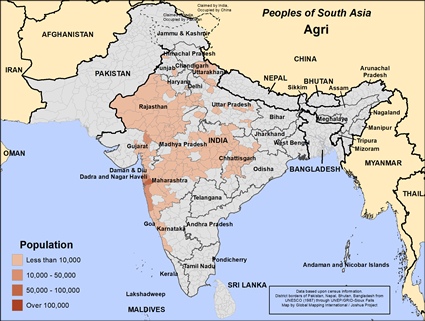Agri in India

Photo Source:
Anonymous
|

Map Source:
People Group data: Omid. Map geography: UNESCO / GMI. Map Design: Joshua Project.
|
| People Name: | Agri |
| Country: | India |
| 10/40 Window: | Yes |
| Population: | 443,000 |
| World Population: | 443,000 |
| Primary Language: | Marathi |
| Primary Religion: | Hinduism |
| Christian Adherents: | 0.00 % |
| Evangelicals: | 0.00 % |
| Scripture: | Complete Bible |
| Ministry Resources: | Yes |
| Jesus Film: | Yes |
| Audio Recordings: | Yes |
| People Cluster: | South Asia Hindu - other |
| Affinity Bloc: | South Asian Peoples |
| Progress Level: |
|
Introduction / History
The Agri are a Hindu people native to suburban Mumbai. They also live in Rajasthan, Delhi and Maharashtra. They speak Marathi. Both husband and wife are responsible for household income and management because there is no dowry.
What Are Their Lives Like?
Some are among India's business communities, selling fish and real estate. Those who are less fortunate harvest salt. In the past, they worked long hours for a pittance, but the Indian government has since changed that.
What Are Their Beliefs?
Agri people practice Hinduism, the ancient religion of India. Hinduism is a catch-all term for the local religions of South Asia, so it is very diverse. At the popular level, Hindus worship and serve the gods of the Hindu pantheon. They visit Hindu temples and offer prayers, food, flowers, and incense to their gods in hopes of gaining protection and benefits. They do not have a personal or familial relationship with their gods like Christians or Jews. There are other Hindus who are much more philosophical, especially among the Brahmins.
Almost all Hindus participate in yearly celebrations like Holi, the festival of colors and the start of spring / Diwali, the festival of lights / Navratri, the celebration of autumn / and Rama Navami, Rama's birthday.
What Are Their Needs?
The average lifespan of a salt worker is just sixty years; many suffer blindness caused by sunlight reflecting off the salt pans, and prolonged exposure to salt leads to severe skin diseases. In remote regions, access to basic healthcare is limited. Thankfully, some have taken notice. The Agri Human Rights Movement (AHRM) serves over 6,000 Agri families, providing medical care, education, and vocational training.
Prayer Points
Pray that Indian churches would adopt this group, pray for them, and advocate for them.
Pray for workers to go into the salt fields and humble dwellings, using creative and fitting ways to share the gospel of the cross and leading them to the hope of Christ.
Ask God to give the Agri a spiritual hunger through dreams of Jesus that will prepare them for an encounter with media and messengers of the faith.
Pray that soon Agri Christ followers would begin to disciple others in their communities.
Pray without ceasing for a harvest among these Hindus, that they would come to know the one true God.